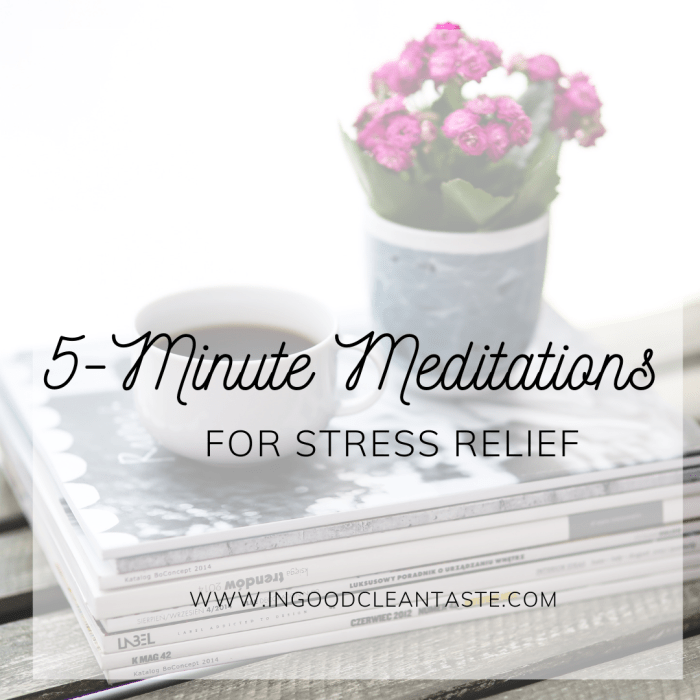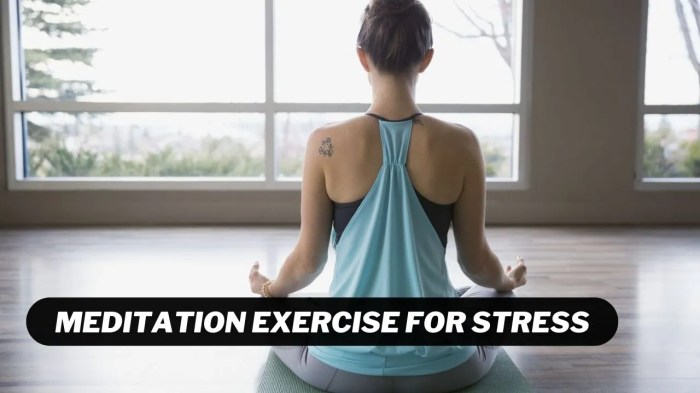With 5 Meditation Exercises to Relieve Daily Stress at the forefront, this paragraph opens a window to an amazing start and intrigue, inviting readers to embark on a storytelling tickling story with mysterious tone style filled with unexpected twists and insights.
Meditation is a powerful tool that can bring peace and tranquility to our hectic lives. In this guide, we will explore five meditation exercises that are specifically designed to help you relieve daily stress and find inner calm amidst the chaos of everyday life. From mindfulness meditation to guided visualization and breathing exercises, these practices offer a path to serenity and emotional balance.
Let’s delve into the world of meditation and discover the transformative power it holds.
Introduction to Meditation Exercises
Meditation is a practice that involves focusing the mind on a particular object, thought, or activity to achieve a state of mental clarity and emotional calmness. The benefits of meditation in relieving stress are well-documented, including reduced anxiety, improved emotional health, enhanced self-awareness, and increased concentration.
Unlike other stress-relief techniques that may involve physical activity or external distractions, meditation exercises focus on quieting the mind and cultivating a sense of inner peace. By training the mind to be present and aware of the current moment, individuals can better manage stressors and respond to challenges with a calmer demeanor.
Importance of Incorporating Meditation into Daily Routines
Integrating meditation into daily routines can have profound effects on overall well-being. By setting aside time each day to practice meditation, individuals can create a sense of balance and harmony in their lives. This regular practice allows for the development of mindfulness, which can help individuals navigate through daily stressors with greater ease and resilience.
Mindfulness Meditation: 5 Meditation Exercises To Relieve Daily Stress

Mindfulness meditation involves focusing your mind on the present moment without judgment, allowing thoughts and feelings to come and go without getting caught up in them. It is about being fully present and aware of your thoughts, emotions, sensations, and surroundings.
How to Practice Mindfulness Meditation
To practice mindfulness meditation for stress relief, follow these steps:
- Find a quiet and comfortable place to sit or lie down.
- Close your eyes and take a few deep breaths to relax.
- Bring your attention to your breath, focusing on the sensation of inhaling and exhaling.
- If your mind starts to wander, gently bring your focus back to your breath without judgment.
- Expand your awareness to include your body sensations, thoughts, and emotions.
- Continue to observe without attachment or reaction, allowing everything to pass through your awareness.
- Practice for 5-10 minutes daily, gradually increasing the duration as you become more comfortable.
Benefits of Mindfulness Meditation for Stress Relief
Mindfulness meditation can help reduce stress by:
- Increasing self-awareness and emotional regulation.
- Improving focus and concentration.
- Promoting relaxation and a sense of calm.
- Enhancing resilience and coping mechanisms in challenging situations.
- Lowering cortisol levels and reducing physical symptoms of stress.
Guided Visualization

Guided visualization is a meditation technique that involves imagining peaceful and calming scenes or scenarios to help relax the mind and reduce stress. This practice allows individuals to focus on positive images and sensations, promoting a sense of inner peace and tranquility.
Examples of Guided Visualization Exercises for Stress Relief:
- Imagine yourself lying on a warm, sunny beach, feeling the gentle breeze and hearing the soothing sound of waves crashing.
- Visualize a serene forest setting, surrounded by tall trees and chirping birds, with sunlight filtering through the leaves.
- Picture yourself floating on a cloud, weightless and free, with nothing but blue skies above and a sense of calm below.
How Guided Visualization Can Help in Calming the Mind and Reducing Stress:
Guided visualization can be a powerful tool in calming the mind and reducing stress by redirecting focus from negative thoughts to positive imagery. By engaging the senses through visualization, individuals can create a mental escape from daily stressors and cultivate a sense of relaxation and peace. This practice can help in lowering cortisol levels, reducing anxiety, and promoting overall well-being.
Body Scan Meditation

Body scan meditation is a mindfulness practice that involves focusing on different parts of the body, progressively moving from one area to another. This technique helps increase body awareness, reduce tension, and promote relaxation, making it an effective tool for stress reduction.When practicing body scan meditation, find a comfortable position either sitting or lying down. Close your eyes and bring your attention to your breath, allowing yourself to relax and be present in the moment.
Start by focusing on the sensations in your toes, then gradually move up through your feet, legs, torso, arms, and head.
How to Perform Body Scan Meditation
- Begin by taking a few deep breaths to center yourself and bring your awareness to the present moment.
- Start by directing your attention to your toes, noticing any sensations, tension, or discomfort in that area.
- Slowly move your focus to the rest of your feet, then up to your ankles, calves, knees, and thighs, taking note of any sensations without judgment.
- Continue scanning through your body, paying attention to each part individually, and releasing any tension or stress you may encounter.
- Finally, bring your awareness back to your breath, feeling the connection between your body and mind.
Connection to Alleviating Daily Stress
Body scan meditation can help alleviate daily stress by promoting relaxation and reducing physical tension in the body. By systematically scanning through each body part, you become more attuned to areas of stress or discomfort, allowing you to release and let go of negative energy. This practice not only helps calm the mind but also improves overall well-being by fostering a sense of deep relaxation and peace.
Breathing Exercises

Breathing exercises play a crucial role in managing stress by helping to calm the mind, reduce anxiety, and promote relaxation. By focusing on the breath, individuals can bring their attention to the present moment and cultivate a sense of inner peace.
Types of Breathing Exercises for Stress Relief, 5 Meditation Exercises to Relieve Daily Stress
There are several types of breathing exercises that are effective for relieving daily stress:
- Deep Breathing: Inhale deeply through your nose, allowing your belly to expand, then exhale slowly through your mouth. Repeat this process several times.
- 4-7-8 Breathing: Inhale for a count of 4, hold your breath for a count of 7, and exhale for a count of 8. This technique can help calm the nervous system.
- Alternate Nostril Breathing: Close one nostril with your thumb and inhale through the other nostril, then switch and exhale through the opposite nostril. This exercise can balance energy levels.
- Box Breathing: Inhale for a count of 4, hold for 4, exhale for 4, and hold for 4 again. Repeat this pattern to create a sense of rhythm and calm.
Benefits of Regular Breathing Exercises
Incorporating regular breathing exercises into your daily routine can have numerous benefits in relieving stress:
- Reduction of Cortisol Levels: Deep breathing can help lower stress hormone levels in the body, promoting relaxation and reducing anxiety.
- Improved Focus and Clarity: By focusing on the breath, individuals can enhance their concentration and mental clarity, leading to a calmer state of mind.
- Enhanced Relaxation Response: Practicing breathing exercises regularly can train the body to activate the relaxation response, counteracting the effects of stress.
- Emotional Regulation: Breathing exercises can help individuals manage their emotions more effectively, leading to better stress management and overall well-being.
Closing Notes

In the realm of daily stress and overwhelming pressures, these 5 meditation exercises serve as beacons of light, guiding you towards a place of serenity and calm. By incorporating these practices into your routine, you can cultivate a sense of inner peace that transcends the chaos of the outside world. Embrace the power of meditation and let it be your sanctuary in moments of turmoil.